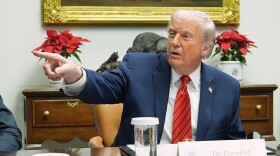-
The Department of Homeland Security announced Friday the immediate termination of all categorical “Family Reunification Parole” programs for foreign nationals from Colombia, Cuba, Ecuador, El Salvador, Guatemala, Haiti, and Honduras, and their immediate family members.
-
President Trump may have executive prerogative to end his predecessor's humanitarian parole for migrants, but the courts may rule that revoking it for current recipients is a breach of the U.S. government's word.
-
Cuban-American Republicans, U.S. Rep. María Elvira Salazar and state Sen. Ileana Garcia, are openly criticizing President Trump's immigration policies.
-
After the U.S. Supreme Court's ruling that the Trump administration can, for now, end humanitarian parole for half a million migrants, immigration advocates insist the legal battle is not over — and believe it will end sooner than later, now in their favor. Most of the beneficiaries, who come from Cuba, Haiti, Venezuela and Nicaragua, are in Florida.
-
In South Florida and around the U.S., migrants on legal programs like TPS and humanitarian parole feel trapped between the hope of recent court rulings protecting their status — and the reality of President Trump's determination to expel them.
-
A federal judge says she will halt the Trump administration from ending a program that allowed Cubans, Haitians, Nicaraguans and Venezuelans to temporarily live in the United States.
-
Refugees had been arriving in the United States at levels unseen in nearly three decades, assisted by nonprofits and ordinary people across the political spectrum. That screeched to a halt after President Donald Trump's inauguration and his administration’s immediate 90-day suspension of the U.S. Refugee Admissions Program.
-
Like hundreds of thousands of Venezuelans hit by political and economic crises, Johann Teran, his wife and her mother applied for different kinds of humanitarian protections in the United States that the Trump administration has curtailed or is expected to end soon.
-
In his first week, President Donald Trump declared a national emergency at the U.S. southern border, reinstated some of his first-term policies and ended programs that allowed people to legally enter the U.S.
-
U.S. Rep. María Elvira Salazar, R-Miami, is pressing the Trump administration to protect migrants who qualified under former President Biden’s “humanitarian parole” program, which specifically allows Cubans, Nicaraguans, Venezuelans and Haitians to live and work in the country for up to two years.
-
A memo appears to allow Immigration and Customs Enforcement officials to target Biden-era programs that let in more than a million people.
-
President Joe Biden let in half a million Cubans, Haitians, Nicaraguans and Venezuelans using a tool known as humanitarian parole. President-elect Donald Trump appears certain to dismantle it, saying during his campaign that he would end the ‘outrageous abuse of parole.’
Play Live Radio
Next Up:
0:00
0:00
Available On Air Stations












